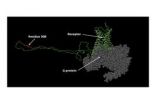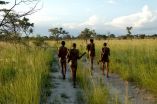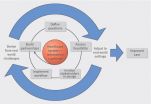The study, led by researchers at Brigham and Women's Hospital (BWH) and Boston Children's Hospital, found that the majority of parents surveyed were interested in newborn genomic testing.
As next-generation whole-exome and genome sequencing is integrated into clinical practice, researchers and clinicians are increasingly interested in genomic testing as a way to provide valuable personalized health information for newborns beyond what existing standard newborn genetic screening produces. But such testing, done shortly after birth, will require the interest and consent of new parents.
"Several other studies have measured parents' interest in newborn genomic screening, but none focused on new parents in the first 48 hours," said Robert C. Green, MD, MPH, a geneticist and researcher at BWH and Harvard Medical School and senior author of the study. "Since this is when genomic testing would be of the greatest value, it is especially important to study parents' attitudes immediately post-partum."
The researchers surveyed 514 parents at the well baby nursery at BWH within 48 hours of their child's birth. After receiving a brief orientation to the genome and its impacts on human health, 82.7 percent of parents reported being somewhat (36 percent), very, (28 percent) or extremely (18 percent) interested in newborn genomic testing. Results were similar regardless of parents' age, gender, race, ethnicity, level of education, family history of genetic disease, or whether or not the infant was a first-born child. Parents who had experienced concerns about the health of their newborn, however, were less likely to be interested in genomic testing.
The study was also the first to investigate whether asking parents about their interest in newborn genomic testing would cause them to reject existing, state-mandated newborn genetic screening (NBS), one of the most established and successful public health programs in the world.
"If even one parent had rejected it, that would have been a problem," said Susan Waisbren, PhD, lead author of the study and a psychologist and researcher in the Division of Genetics and Genomics at Boston Children's and Harvard Medical School. "But out of over 500 parents surveyed, not one of them questioned or rejected NBS."
The study was also the first to survey parents separately. Most couples were in agreement about their level of interest in newborn genomic testing.
"About 75 percent of couples were in concordance," Waisbren said. "This suggests that both parents should be involved when we are addressing concerns they may have about newborn genomic testing."
"Parents' strong interest in genomic screening for their newborns, as demonstrated by this study, underscores the importance of further research exploring the public health impacts of actually providing this testing," said Green, "particularly as it continues to become less expensive and more widely available."
INFORMATION:
Green and Alan Beggs, PhD, of Boston Children's co-direct the BabySeq Project in which, pending IRB review and approval, parents of several hundred healthy and sick newborn infants will be offered genomic sequencing in a research setting beginning in early 2015.
This research was funded by Brigham and Women's Biomedical Research Institute seed funding, the Galactosemia Foundation (S.E.W.), the National PKU Alliance (S.E.W.), and National Institutes of Health grants HD077671, HG006500, HG005092, and HG006615.
About Brigham and Women's Hospital
Brigham and Women's Hospital (BWH) is a 793-bed nonprofit teaching affiliate of Harvard Medical School and a founding member of Partners HealthCare. BWH has more than 3.5 million annual patient visits, is the largest birthing center in Massachusetts and employs nearly 15,000 people. The Brigham's medical preeminence dates back to 1832, and today that rich history in clinical care is coupled with its national leadership in patient care, quality improvement and patient safety initiatives, and its dedication to research, innovation, community engagement and educating and training the next generation of health care professionals. Through investigation and discovery conducted at its Brigham Research Institute (BRI), BWH is an international leader in basic, clinical and translational research on human diseases, more than 1,000 physician-investigators and renowned biomedical scientists and faculty supported by nearly $650 million in funding. For the last 25 years, BWH ranked second in research funding from the National Institutes of Health (NIH) among independent hospitals. BWH continually pushes the boundaries of medicine, including building on its legacy in transplantation by performing a partial face transplant in 2009 and the nation's first full face transplant in 2011. BWH is also home to major landmark epidemiologic population studies, including the Nurses' and Physicians' Health Studies and the Women's Health Initiative. For more information, resources and to follow us on social media, please visit BWH's online newsroom.
About Boston Children's Hospital
Boston Children's Hospital is home to the world's largest research enterprise based at a pediatric medical center, where its discoveries have benefited both children and adults since1869. More than 1,100 scientists, including seven members of the National Academy of Sciences, 14 members of the Institute of Medicine and 14 members of the Howard Hughes Medical Institute comprise Boston Children's research community. Founded as a 20-bed hospital for children, Boston Children's today is a 395-bed comprehensive center for pediatric and adolescent health care. Boston Children's is also the primary pediatric teaching affiliate of Harvard Medical School.
For more information about research and clinical innovation at Boston Children's Hospital, visit: http://vectorblog.org
To learn more about pediatric health, visit our Thriving blog: http://childrenshospitalblog.org
Join the social discussion and tweet us @BostonChildrens
Follow Boston Children's Hospital on Facebook: http://on.bchil.org/1mJ9fxf
Follow Boston Children's Hospital on Youtube: http://on.bchil.org/1oJib5B






